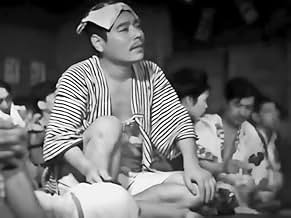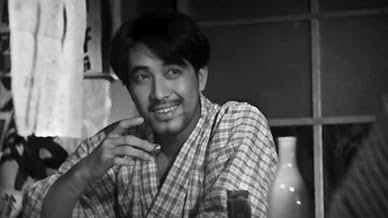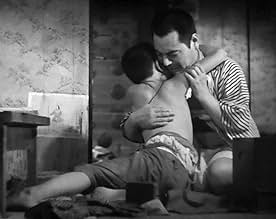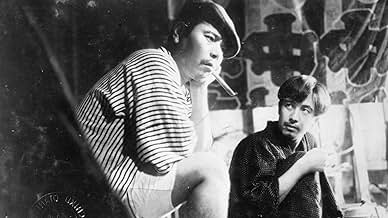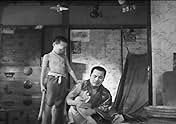AVALIAÇÃO DA IMDb
7,2/10
1,6 mil
SUA AVALIAÇÃO
Adicionar um enredo no seu idiomaTwo Tokyo co-workers come across a destitute young lady in search of a place to live.Two Tokyo co-workers come across a destitute young lady in search of a place to live.Two Tokyo co-workers come across a destitute young lady in search of a place to live.
- Direção
- Roteiristas
- Artistas
- Prêmios
- 1 vitória no total
Den Ôhinata
- Jiro
- (as Den Obinata)
Tomio Aoki
- Tomio
- (as Tokkan Kozô)
Chishû Ryû
- Man on boat
- (não creditado)
Hideo Sugawara
- Boy Taunting Tomio
- (não creditado)
- Direção
- Roteiristas
- Elenco e equipe completos
- Produção, bilheteria e muito mais no IMDbPro
Avaliações em destaque
Ozu has often used the theme of father and son relationships in his films and here he explores a little more besides. Beyond the relationship of Kihachi the father and Tomio the young son you get the widower Kihachi trying to become closer to the pretty, much younger Harue. This silent film speaks volumes about family, about hopes but it is Ozu's light comic touch which makes it another great film of his. It is completely silent but it is compelling, actually a story that could be retold and remade in any corner of the globe. The acting is just about universally good and the film has a lot of heart attached to its sometimes ordinary theme. Then again, Ozu has always made extraordinary out of the ordinary. Here is another example of the master at work.
Another early Ozu where family ties - severely tested but affirmed - steer the world away from havoc and into good. Another early Ozu that documents Japanese society being pushed through the wringer of Western influence, cinematically reflected with Chaplinesque beats: the father is a lazy factory worker and no good man-about-town, in stark contrast to the meek, corporate executive father in I Was Born But.., and once more the stubborn son has to live with the shame.
This go round and in comparison to the above film, the intended seduction of suburban life is less effective. The innocence of childhood is less the fulcrum of discovery of how the world works, and more a counterpoint to ordinary drama; thwarted love, strained friendship, high-minded sacrifice in the end that seduces noble, better persons out of everyone.
Everything turns out the way it does for a reason, the film whimsically asserts. Why is sea water salty? But of course for us to salt salmon with.
It is good and was awarded that year with a Kinema Jumpo beating films by future rivals Mizoguchi and Naruse. I assume it won for the denouement of selfless humanity - inspirationally miraculous and accompanied by fireworks in the sky - that must have echoed desirably at tumultuous times such as those, but there were more interesting things afoot in Japanese cinema of the time.
This go round and in comparison to the above film, the intended seduction of suburban life is less effective. The innocence of childhood is less the fulcrum of discovery of how the world works, and more a counterpoint to ordinary drama; thwarted love, strained friendship, high-minded sacrifice in the end that seduces noble, better persons out of everyone.
Everything turns out the way it does for a reason, the film whimsically asserts. Why is sea water salty? But of course for us to salt salmon with.
It is good and was awarded that year with a Kinema Jumpo beating films by future rivals Mizoguchi and Naruse. I assume it won for the denouement of selfless humanity - inspirationally miraculous and accompanied by fireworks in the sky - that must have echoed desirably at tumultuous times such as those, but there were more interesting things afoot in Japanese cinema of the time.
Takeshi Sakamoto and Tokan Kozzo team up memorably yet again as an unemployed illiterate drunk and his resentful son, in this sentimental study of working class father-son relationships. As in I WAS BORN BUT... and TOKYO CHORUS, Ozu explores how children measure their self-esteem in their parents.
Yasujiro Ozu is an extremely well respected film director. While not as famous today as his countryman, Kurosawa, among those who are fans of Japanese cinema, he is practically a god. While I have loved many of his films due to their amazing artistry and great direction, I also think that overall, many of his films are a tad overrated. In other words, because SOME films are near-perfect classics (such as both versions of FLOATING WEEDS or my favorite, LATE SPRING), people often tend to see ALL of his films as having the same quality. This is true of all the great directors, as there are a devoted group of followers that see every film as great--even if the films have obvious flaws or were made before the directors learned and perfected their craft.
I mention all this because although PASSING FANCY is a very good film, it's far from great--despite some amazingly positive reviews. While it's true that the Japanese film industry didn't switch to sound until very, very late compared to Western countries, shouldn't this be considered when giving out 10s to these silents? In other words, shouldn't technical merit be considered when reviewing a film? As such, I'd have to knock a point off the film. In addition, the film's plot is amazingly scant and a bit too ordinary.
Now in Ozu's defense, I must say that when it comes to the ordinary, nobody does it better. Here we have the story of a hard-drinking blue collar man and his young son and there's not a lot of excitement or action...but it STILL engages the audience due to his nice touch and excellent acting. In addition, the ending is very sweet and well done--even if nothing is exactly resolved in this story of very mundane individuals.
Well done and worth seeing but not exactly magical.
I mention all this because although PASSING FANCY is a very good film, it's far from great--despite some amazingly positive reviews. While it's true that the Japanese film industry didn't switch to sound until very, very late compared to Western countries, shouldn't this be considered when giving out 10s to these silents? In other words, shouldn't technical merit be considered when reviewing a film? As such, I'd have to knock a point off the film. In addition, the film's plot is amazingly scant and a bit too ordinary.
Now in Ozu's defense, I must say that when it comes to the ordinary, nobody does it better. Here we have the story of a hard-drinking blue collar man and his young son and there's not a lot of excitement or action...but it STILL engages the audience due to his nice touch and excellent acting. In addition, the ending is very sweet and well done--even if nothing is exactly resolved in this story of very mundane individuals.
Well done and worth seeing but not exactly magical.
This rarely screened silent gem shows Ozu rather early in his career. It presents the story of a poor factory worker trying to raise his son despite many obstacles and hardships. The biggest obstacle of all is the father himself who, though well intentioned and charismatic, makes one mistake in judgment after another. The father manages to get through all his many trials and tribulations thanks to the support (not always warmly) given by his friends and neighbors.
The most interesting thing for me about Passing Fancy is the way it uses a quite hard boiled, gritty realism and coarsely drawn, boorish characters to elicit very tender feelings in the viewer. The mixture of humor and pathos that advances the plot would be impossible for lesser directors or a weak cast to pull off, but in the hands of this troupe the whole enterprise succeeds wonderfully. Somehow, you may find yourself tempted to cry despite the near-total absence of sentimentality.
The acting is excellent all around, but the young boy deserves special mention. To Japanese, particularly at the time, the boy's behavior must have seemed shockingly inappropriate and unfilial, but his antics and facial expressions are very funny.
It is hard to believe that this is one of three movies that Ozu directed in 1933 alone. If the opportunity arises to see this movie, make every effort to see it.
The most interesting thing for me about Passing Fancy is the way it uses a quite hard boiled, gritty realism and coarsely drawn, boorish characters to elicit very tender feelings in the viewer. The mixture of humor and pathos that advances the plot would be impossible for lesser directors or a weak cast to pull off, but in the hands of this troupe the whole enterprise succeeds wonderfully. Somehow, you may find yourself tempted to cry despite the near-total absence of sentimentality.
The acting is excellent all around, but the young boy deserves special mention. To Japanese, particularly at the time, the boy's behavior must have seemed shockingly inappropriate and unfilial, but his antics and facial expressions are very funny.
It is hard to believe that this is one of three movies that Ozu directed in 1933 alone. If the opportunity arises to see this movie, make every effort to see it.
Você sabia?
- CuriosidadesYasujirô Ozu regular Chishû Ryû has a small role towards the end of the film as a fellow passenger on board a ship, playing an uncredited "Man on Boat".
- Erros de gravaçãoKihachi states that 50 sen to a boy his age (referring to Tomio) is like 10 ryo to him and Otome. The ryo was replaced by the yen in 1871, over 60 years earlier. (The yen replaced the ryo at par; there are 100 sen to the yen.)
However, Otome then says, "No, more like 1,000 yen!" So, it's possible "ryo" was still being used synonymously with "yen" over a half-century later.
- ConexõesFeatured in Transcendental Style and Flatulence (2017)
Principais escolhas
Faça login para avaliar e ver a lista de recomendações personalizadas
Detalhes
- Tempo de duração
- 1 h 40 min(100 min)
- Cor
- Mixagem de som
- Proporção
- 1.37 : 1
Contribua para esta página
Sugerir uma alteração ou adicionar conteúdo ausente

